2013 Peugeot 3008 Hybrid 4 towing
[x] Cancel search: towingPage 5 of 340
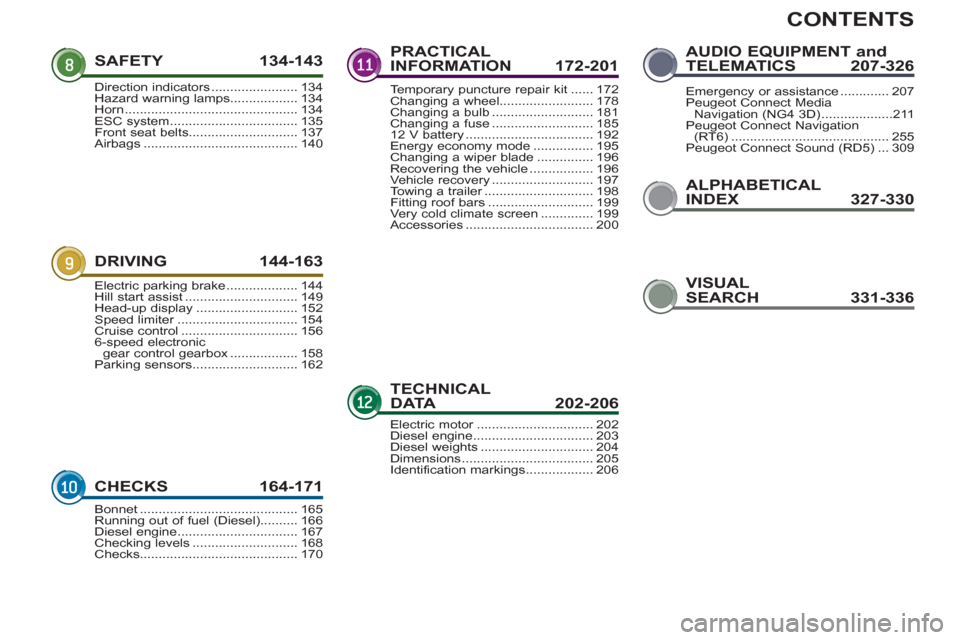
CONTENTS
ALPHABETICAL
INDEX 327-330 SAFETY 134-14
3
DRIVING 144-163
CHECKS 164-171
PRACTICAL
INFORMATION 172-201
TECHNICALDATA 202-206
AUDIO EQUIPMENT andTELEMATICS 207-326
Direction indicators.......................134Hazard warning lamps..................134Horn..............................................134ESC system ..................................135Front seat belts.............................137Airbags.........................................140
Electric parking brake ...................144Hill start assist..............................149Head-up display...........................152Speed limiter................................r154Cruise control...............................1566-speed electronic
gear control gearbox..................158Parking sensors ............................162
Bonnet..........................................165Running out of fuel (Diesel)..........166Diesel engine................................167Checking levels............................168Checks..........................................170
Temporary puncture repair kit......172Changing a wheel.........................178Changing a bulb...........................181Changing a fuse ...........................18512 V battery ..................................192Energy economy mode................195Changing a wiper blade...............196Recovering the vehicle.................196Vehicle recovery ...........................197Towing a trailer.............................r198Fitting roof bars............................199Very cold climate screen..............199Accessories..................................200
Electric motor...............................r202Diesel engine................................203Diesel weights ..............................204Dimensions ...................................205Identification markings..................206
VISUAL
SEARCH 331-336
Emergency or assistance.............207Peugeot Connect Media
Navigation (NG4 3D)...................211Peugeot Connect Navigation(RT6) ..........................................255Peugeot Connect Sound (RD5)...309
Page 24 of 340
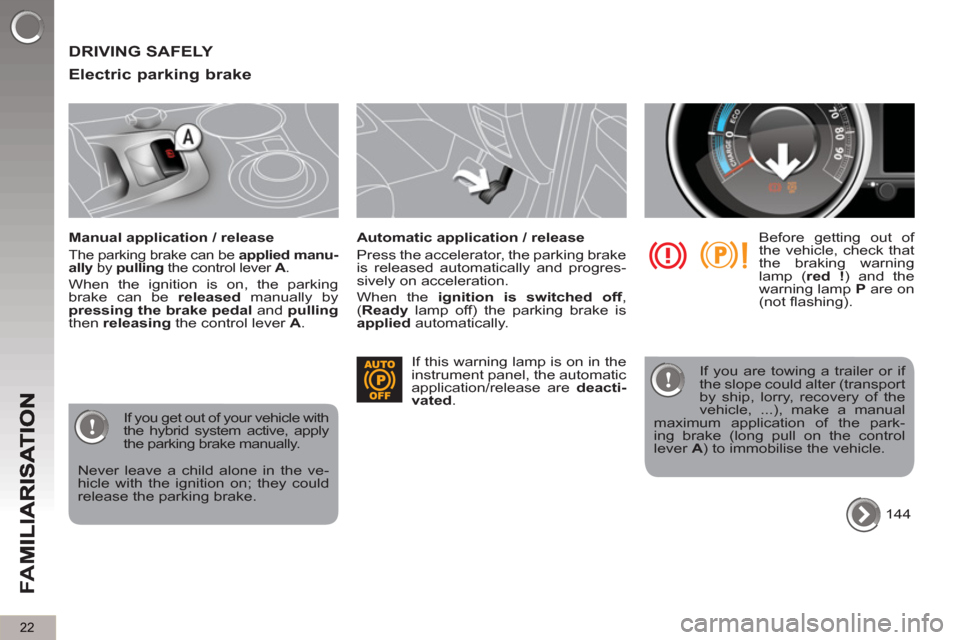
22
FA
M
DRIVING SAFELY
Electric parkin
g brake
Manual application / release
The parking brake can be applied manu-
ally
by pulling
the control lever A
.
When the ignition is on, the parking
brake can be released
manually by
pressing the brake pedal
and pulling
then releasing
the control lever A
.
Automatic application / release
Press the accelerator, the parking brake
is released automatically and progres-
sively on acceleration.
When the ignition is switched off
,
( Ready
lamp off) the parking brake is
applied
automatically.
If you get out of your vehicle with
the hybrid system active, apply
the parking brake manually.
Before getting out of
the vehicle, check that
the braking warning
lamp ( red !
) and the
warning lamp P
are on
(not fl ashing).
Never leave a child alone in the ve-
hicle with the ignition on; they could
release the parking brake.
144 If this warning lamp is on in the
instrument panel, the automatic
application/release are deacti-
vated
.
If you are towing a trailer or if
the slope could alter (transport
by ship, lorry, recovery of the
vehicle, ...), make a manual
maximum application of the park-
ing brake (long pull on the control
lever A
) to immobilise the vehicle.
Page 48 of 340
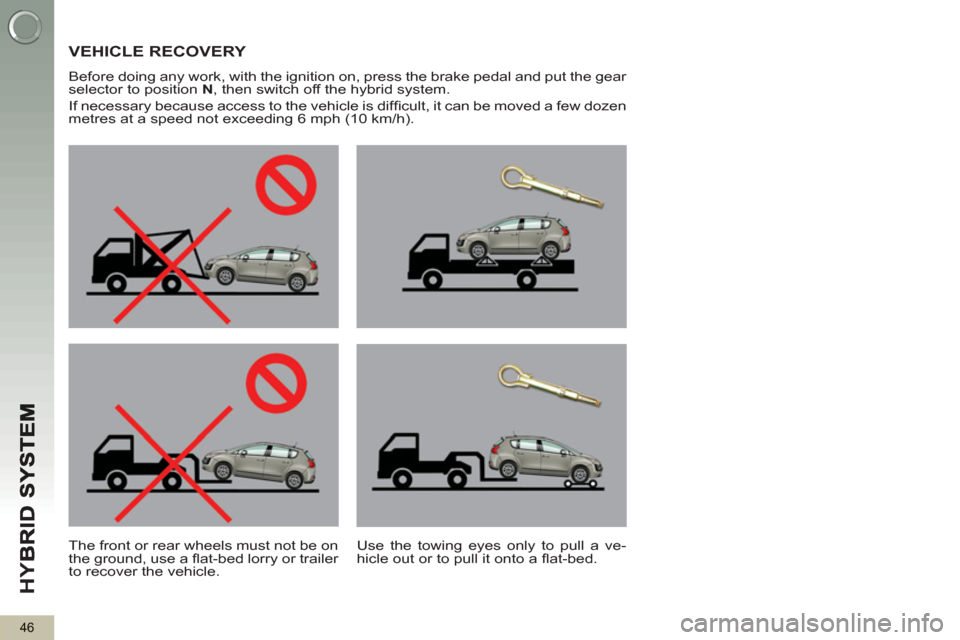
HY
B
46
VEHICLE RECOVERY
Before doing any work, with the ignition on, press the brake pedal and put the gear
selector to position N
, then switch off the hybrid system.
If necessary because access to the vehicle is diffi cult, it can be moved a few dozen
metres at a speed not exceeding 6 mph (10 km/h).
The front or rear wheels must not be on
the ground, use a fl at-bed lorry or trailer
to recover the vehicle.
Use the towing eyes only to pull a ve-
hicle out or to pull it onto a fl at-bed.
Page 74 of 340
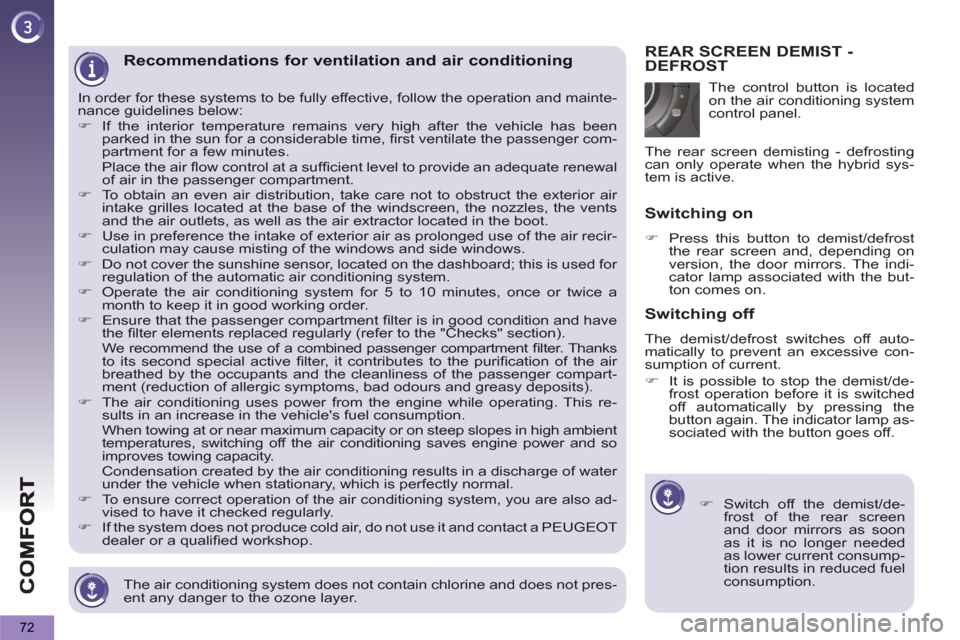
72
The air conditioning system does not contain chlorine and does not pres-
ent any danger to the ozone layer.
Recommendations for ventilation and air conditioning
In order for these systems to be fully effective, follow the operation and mainte-
nance guidelines below:
�)
If the interior temperature remains very high after the vehicle has been
parked in the sun for a considerable time, fi rst ventilate the passenger com-
partment for a few minutes.
Place the air fl ow control at a suffi cient level to provide an adequate renewal
of air in the passenger compartment.
�)
To obtain an even air distribution, take care not to obstruct the exterior air
intake grilles located at the base of the windscreen, the nozzles, the vents
and the air outlets, as well as the air extractor located in the boot.
�)
Use in preference the intake of exterior air as prolonged use of the air recir-
culation may cause misting of the windows and side windows.
�)
Do not cover the sunshine sensor, located on the dashboard; this is used for
regulation of the automatic air conditioning system.
�)
Operate the air conditioning system for 5 to 10 minutes, once or twice a
month to keep it in good working order.
�)
Ensure that the passenger compartment fi lter is in good condition and have
the fi lter elements replaced regularly (refer to the "Checks" section).
We recommend the use of a combined passenger compartment fi lter. Thanks
to its second special active fi lter, it contributes to the purifi cation of the air
breathed by the occupants and the cleanliness of the passenger compart-
ment (reduction of allergic symptoms, bad odours and greasy deposits).
�)
The air conditioning uses power from the engine while operating. This re-
sults in an increase in the vehicle's fuel consumption.
When towing at or near maximum capacity or on steep slopes in high ambient
temperatures, switching off the air conditioning saves engine power and so
improves towing capacity.
Condensation created by the air conditioning results in a discharge of water
under the vehicle when stationary, which is perfectly normal.
�)
To ensure correct operation of the air conditioning system, you are also ad-
vised to have it checked regularly.
�)
If the system does not produce cold air, do not use it and contact a PEUGEOT
dealer or a qualifi ed workshop. The control button is located
on the air conditioning system
control panel.
REAR SCREEN DEMIST - DEFROST
�)
Switch off the demist/de-
frost of the rear screen
and door mirrors as soon
as it is no longer needed
as lower current consump-
tion results in reduced fuel
consumption.
Switching on
�)
Press this button to demist/defrost
the rear screen and, depending on
version, the door mirrors. The indi-
cator lamp associated with the but-
ton comes on.
Switching off
The demist/defrost switches off auto-
matically to prevent an excessive con-
sumption of current.
�)
It is possible to stop the demist/de-
frost operation before it is switched
off automatically by pressing the
button again. The indicator lamp as-
sociated with the button goes off.
The rear screen demisting - defrosting
can only operate when the hybrid sys-
tem is active.
Page 136 of 340
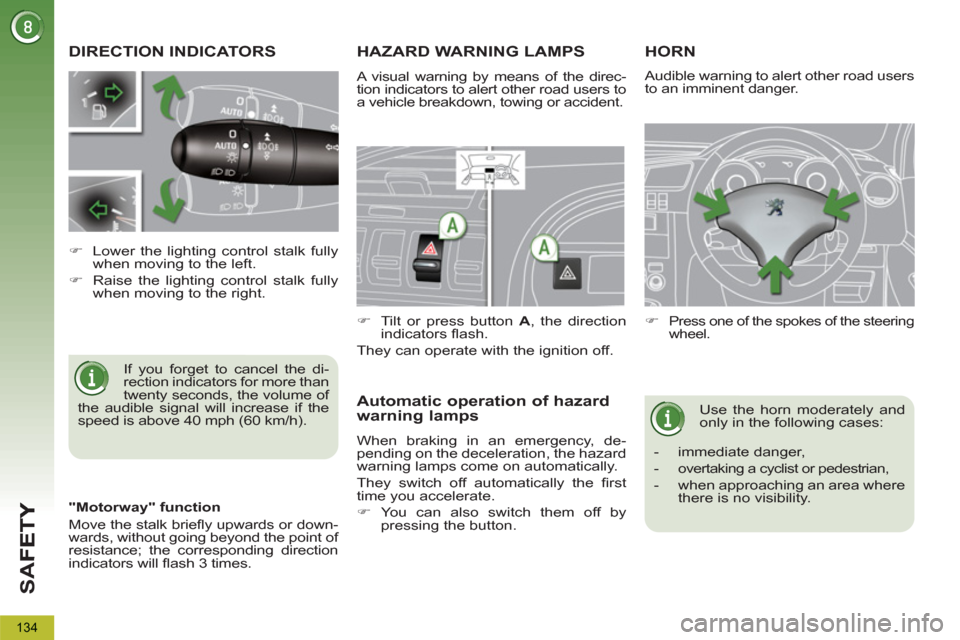
SA
F
134
DIRECTION INDICATORS
If you forget to cancel the di-
rection indicators for more than
twenty seconds, the volume of
the audible signal will increase if the
speed is above 40 mph (60 km/h).
�)
Lower the lighting control stalk fully
when moving to the left.
�)
Raise the lighting control stalk fully
when moving to the right.
HAZARD WARNING LAMPS
A visual warning by means of the direc-
tion indicators to alert other road users to
a vehicle breakdown, towing or accident.
�)
Tilt or press button A
, the direction
indicators fl ash.
They can operate with the ignition off.
Automatic operation of hazard
warning lamps
When braking in an emergency, de-
pending on the deceleration, the hazard
warning lamps come on automatically.
They switch off automatically the fi rst
time you accelerate.
�)
You can also switch them off by
pressing the button.
HORN
�)
Press one of the spokes of the steering
wheel.
Use the horn moderately and
only in the following cases:
- immediate danger,
- overtaking a cyclist or pedestrian,
- when approaching an area where
there is no visibility.
Audible warning to alert other road users
to an imminent danger.
"Motorway" function
Move the stalk briefl y upwards or down-
wards, without going beyond the point of
resistance; the corresponding direction
indicators will fl ash 3 times.
Page 146 of 340
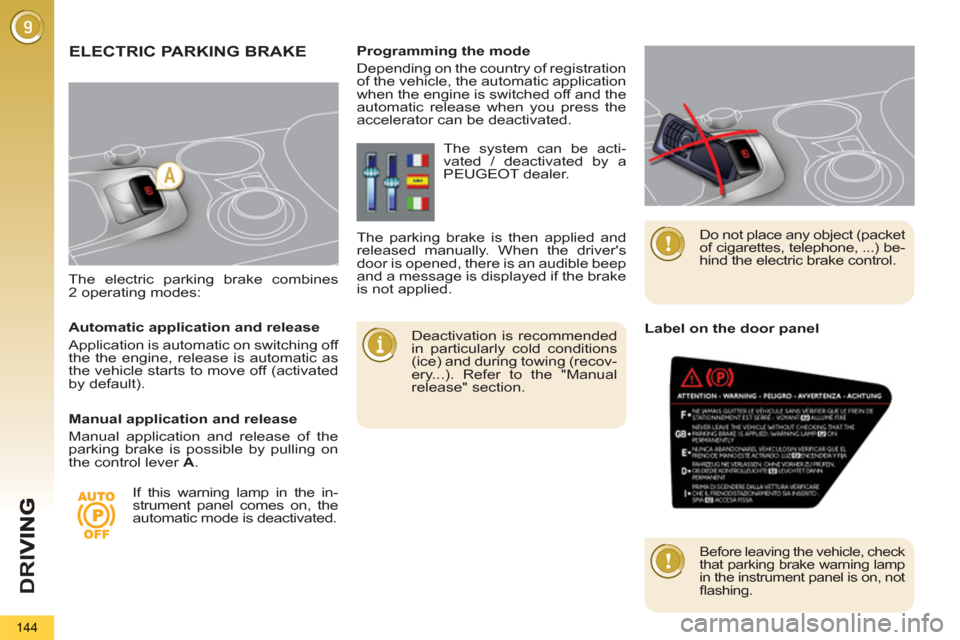
D
R
I
144
The electric parking brake combines
2 operating modes:
ELECTRIC PARKING BRAKE
Deactivation is recommended
in particularly cold conditions
(ice) and during towing (recov-
ery...). Refer to the "Manual
release" section.
Programming the mode
Depending on the country of registration
of the vehicle, the automatic application
when the engine is switched off and the
automatic release when you press the
accelerator can be deactivated.
If this warning lamp in the in-
strument panel comes on, the
automatic mode is deactivated. The system can be acti-
vated / deactivated by a
PEUGEOT dealer.
The parking brake is then applied and
released manually. When the driver's
door is opened, there is an audible beep
and a message is displayed if the brake
is not applied.
Do not place any object (packet
of cigarettes, telephone, ...) be-
hind the electric brake control.
Automatic application and release
Application is automatic on switching off
the the engine, release is automatic as
the vehicle starts to move off (activated
by default).
Manual application and release
Manual application and release of the
parking brake is possible by pulling on
the control lever A
.
Label on the door panel
Before leaving the vehicle, check
that parking brake warning lamp
in the instrument panel is on, not
fl ashing.
Page 147 of 340
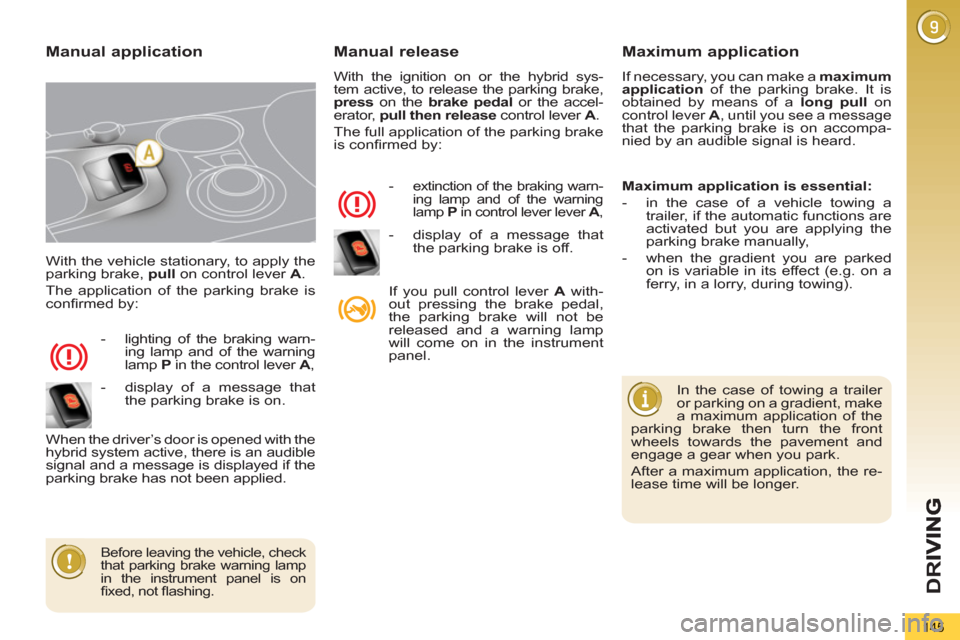
D
R
145
With the vehicle stationary, to apply the
parking brake, pull
on control lever A
.
The application of the parking brake is
confi rmed by:
- lighting of the braking warn-
ing lamp and of the warning
lamp P
in the control lever A
,
When the driver’s door is opened with the
hybrid system active, there is an audible
signal and a message is displayed if the
parking brake has not been applied.
Manual release
With the ignition on or the hybrid sys-
tem active, to release the parking brake,
press
on the brake
pedal
or the accel-
erator, pull then release
control lever A
.
The full application of the parking brake
is confi rmed by:
-
extinction of the braking warn-
ing lamp and of the warning
lamp P
in control lever lever A
,
If you pull control lever A
with-
out pressing the brake pedal,
the parking brake will not be
released and a warning lamp
will come on in the instrument
panel.
Manual applicationMaximum application
If necessary, you can make a maximum
application
of the parking brake. It is
obtained by means of a long pull
on
control lever A
, until you see a message
that the parking brake is on accompa-
nied by an audible signal is heard.
In the case of towing a trailer
or parking on a gradient, make
a maximum application of the
parking brake then turn the front
wheels towards the pavement and
engage a gear when you park.
After a maximum application, the re-
lease time will be longer.
Before leaving the vehicle, check
that parking brake warning lamp
in the instrument panel is on
fi xed, not fl ashing.
Maximum application is essential:
- in the case of a vehicle towing a
trailer, if the automatic functions are
activated but you are applying the
parking brake manually,
- when the gradient you are parked
on is variable in its effect (e.g. on a
ferry, in a lorry, during towing).
- display of a message that
the parking brake is on.
- display of a message that
the parking brake is off.
Page 148 of 340
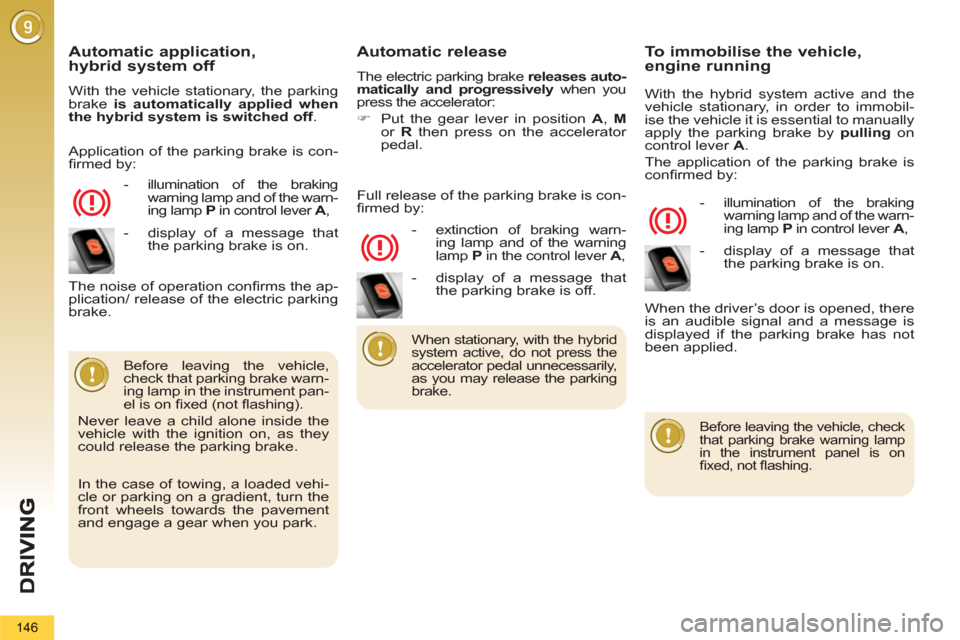
146
Automatic application,
hybrid system off
With the vehicle stationary, the parking
brake is automatically applied when
the hybrid system is switched off.
- illumination of the braking
warning lamp and of the warn-
ing lamp P
in control lever A
,
Automatic release
The electric parking brake releases auto-
matically and progressively
when you
press the accelerator:
�)
Put the gear lever in position A
, M
or R
then press on the accelerator
pedal.
Before leaving the vehicle,
check that parking brake warn-
ing lamp in the instrument pan-
el is on fi xed (not fl ashing).
Never leave a child alone inside the
vehicle with the ignition on, as they
could release the parking brake.
- extinction of braking warn-
ing lamp and of the warning
lamp P
in the control lever A
,
The noise of operation confi rms the ap-
plication/ release of the electric parking
brake. Full release of the parking brake is con-
fi rmed by:
To immobilise the vehicle,
engine running
With the hybrid system active and the
vehicle stationary, in order to immobil-
ise the vehicle it is essential to manually
apply the parking brake by pulling
on
control lever A
.
The application of the parking brake is
confi rmed by:
- illumination of the braking
warning lamp and of the warn-
ing lamp P
in control lever A
,
When the driver’s door is opened, there
is an audible signal and a message is
displayed if the parking brake has not
been applied.
Before leaving the vehicle, check
that parking brake warning lamp
in the instrument panel is on
fi xed, not fl ashing.
When stationary, with the hybrid
system active, do not press the
accelerator pedal unnecessarily,
as you may release the parking
brake.
Application of the parking brake is con-
fi rmed by:
- display of a message that
the parking brake is on.
In the case of towing, a loaded vehi-
cle or parking on a gradient, turn the
front wheels towards the pavement
and engage a gear when you park.
- display of a message that
the parking brake is off.
- display of a message that
the parking brake is on.